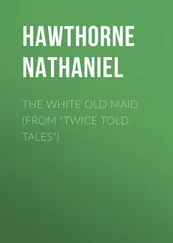His face darkened, and seemed to contract, and shrivel itself up, and wither into age.
“Never, sir!” he repeated. “I could never draw cheerful breath there!”
“I should think not,” said the old gentleman, eyeing Clifford earnestly, and rather apprehensively. “I should conceive not, sir, with that notion in your head!”
“Surely not,” continued Clifford; “and it were a relief to me if that house could be torn down, or burnt up, and so the earth be rid of it, and grass be sown abundantly over its foundation. Not that I should ever visit its site again! for, sir, the farther I get away from it, the more does the joy, the lightsome freshness, the heart-leap, the intellectual dance, the youth, in short, — yes, my youth, my youth! — the more does it come back to me. No longer ago than this morning, I was old. I remember looking in the glass, and wondering at my own gray hair, and the wrinkles, many and deep, right across my brow, and the furrows down my cheeks, and the prodigious trampling of crow’s-feet about my temples! It was too soon! I could not bear it! Age had no right to come! I had not lived! But now do I look old? If so, my aspect belies me strangely; for — a great weight being off my mind — I feel in the very heyday of my youth, with the world and my best days before me!”
“I trust you may find it so,” said the old gentleman, who seemed rather embarrassed, and desirous of avoiding the observation which Clifford’s wild talk drew on them both. “You have my best wishes for it.”
“For Heaven’s sake, dear Clifford, be quiet!” whispered his sister. “They think you mad.”
“Be quiet yourself, Hepzibah!” returned her brother. “No matter what they think! I am not mad. For the first time in thirty years my thoughts gush up and find words ready for them. I must talk, and I will!”
He turned again towards the old gentleman, and renewed the conversation.
“Yes, my dear sir,” said he, “it is my firm belief and hope that these terms of roof and hearthstone, which have so long been held to embody something sacred, are soon to pass out of men’s daily use, and be forgotten. Just imagine, for a moment, how much of human evil will crumble away, with this one change! What we call real estate — the solid ground to build a house on — is the broad foundation on which nearly all the guilt of this world rests. A man will commit almost any wrong, — he will heap up an immense pile of wickedness, as hard as granite, and which will weigh as heavily upon his soul, to eternal ages, — only to build a great, gloomy, dark-chambered mansion, for himself to die in, and for his posterity to be miserable in. He lays his own dead corpse beneath the underpinning, as one may say, and hangs his frowning picture on the wall, and, after thus converting himself into an evil destiny, expects his remotest great-grandchildren to be happy there. I do not speak wildly. I have just such a house in my mind’s eye!”
“Then, sir,” said the old gentleman, getting anxious to drop the subject, “you are not to blame for leaving it.”
“Within the lifetime of the child already born,” Clifford went on, “all this will be done away. The world is growing too ethereal and spiritual to bear these enormities a great while longer. To me, though, for a considerable period of time, I have lived chiefly in retirement, and know less of such things than most men, — even to me, the harbingers of a better era are unmistakable. Mesmerism, now! Will that effect nothing, think you, towards purging away the grossness out of human life?”
“All a humbug!” growled the old gentleman.
“These rapping spirits, that little Phoebe told us of, the other day,” said Clifford, — ”what are these but the messengers of the spiritual world, knocking at the door of substance? And it shall be flung wide open!”
“A humbug, again!” cried the old gentleman, growing more and more testy at these glimpses of Clifford’s metaphysics. “I should like to rap with a good stick on the empty pates of the dolts who circulate such nonsense!”
“Then there is electricity, — the demon, the angel, the mighty physical power, the all-pervading intelligence!” exclaimed Clifford. “Is that a humbug, too? Is it a fact — or have I dreamt it — that, by means of electricity, the world of matter has become a great nerve, vibrating thousands of miles in a breathless point of time? Rather, the round globe is a vast head, a brain, instinct with intelligence! Or, shall we say, it is itself a thought, nothing but thought, and no longer the substance which we deemed it!”
“If you mean the telegraph,” said the old gentleman, glancing his eye toward its wire, alongside the rail-track, “it is an excellent thing, — that is, of course, if the speculators in cotton and politics don’t get possession of it. A great thing, indeed, sir, particularly as regards the detection of bank-robbers and murderers.”
“I don’t quite like it, in that point of view,” replied Clifford. “A bank-robber, and what you call a murderer, likewise, has his rights, which men of enlightened humanity and conscience should regard in so much the more liberal spirit, because the bulk of society is prone to controvert their existence. An almost spiritual medium, like the electric telegraph, should be consecrated to high, deep, joyful, and holy missions. Lovers, day by, day — hour by hour, if so often moved to do it, — might send their heart-throbs from Maine to Florida, with some such words as these ‘I love you forever!’ — ‘My heart runs over with love!’ — ‘I love you more than I can!’ and, again, at the next message ‘I have lived an hour longer, and love you twice as much!’ Or, when a good man has departed, his distant friend should be conscious of an electric thrill, as from the world of happy spirits, telling him ‘Your dear friend is in bliss!’ Or, to an absent husband, should come tidings thus ‘An immortal being, of whom you are the father, has this moment come from God!’ and immediately its little voice would seem to have reached so far, and to be echoing in his heart. But for these poor rogues, the bank-robbers, — who, after all, are about as honest as nine people in ten, except that they disregard certain formalities, and prefer to transact business at midnight rather than ‘Change-hours, — and for these murderers, as you phrase it, who are often excusable in the motives of their deed, and deserve to be ranked among public benefactors, if we consider only its result, — for unfortunate individuals like these, I really cannot applaud the enlistment of an immaterial and miraculous power in the universal world-hunt at their heels!”
“You can’t, hey?” cried the old gentleman, with a hard look.
“Positively, no!” answered Clifford. “It puts them too miserably at disadvantage. For example, sir, in a dark, low, cross-beamed, panelled room of an old house, let us suppose a dead man, sitting in an armchair, with a bloodstain on his shirt-bosom, — and let us add to our hypothesis another man, issuing from the house, which he feels to be overfilled with the dead man’s presence, — and let us lastly imagine him fleeing, Heaven knows whither, at the speed of a hurricane, by railroad! Now, sir, if the fugitive alight in some distant town, and find all the people babbling about that selfsame dead man, whom he has fled so far to avoid the sight and thought of, will you not allow that his natural rights have been infringed? He has been deprived of his city of refuge, and, in my humble opinion, has suffered infinite wrong!”
“You are a strange man; Sir!” said the old gentleman, bringing his gimlet-eye to a point on Clifford, as if determined to bore right into him. “I can’t see through you!”
“No, I’ll be bound you can’t!” cried Clifford, laughing. “And yet, my dear sir, I am as transparent as the water of Maule’s well! But come, Hepzibah! We have flown far enough for once. Let us alight, as the birds do, and perch ourselves on the nearest twig, and consult wither we shall fly next!”
Читать дальше












